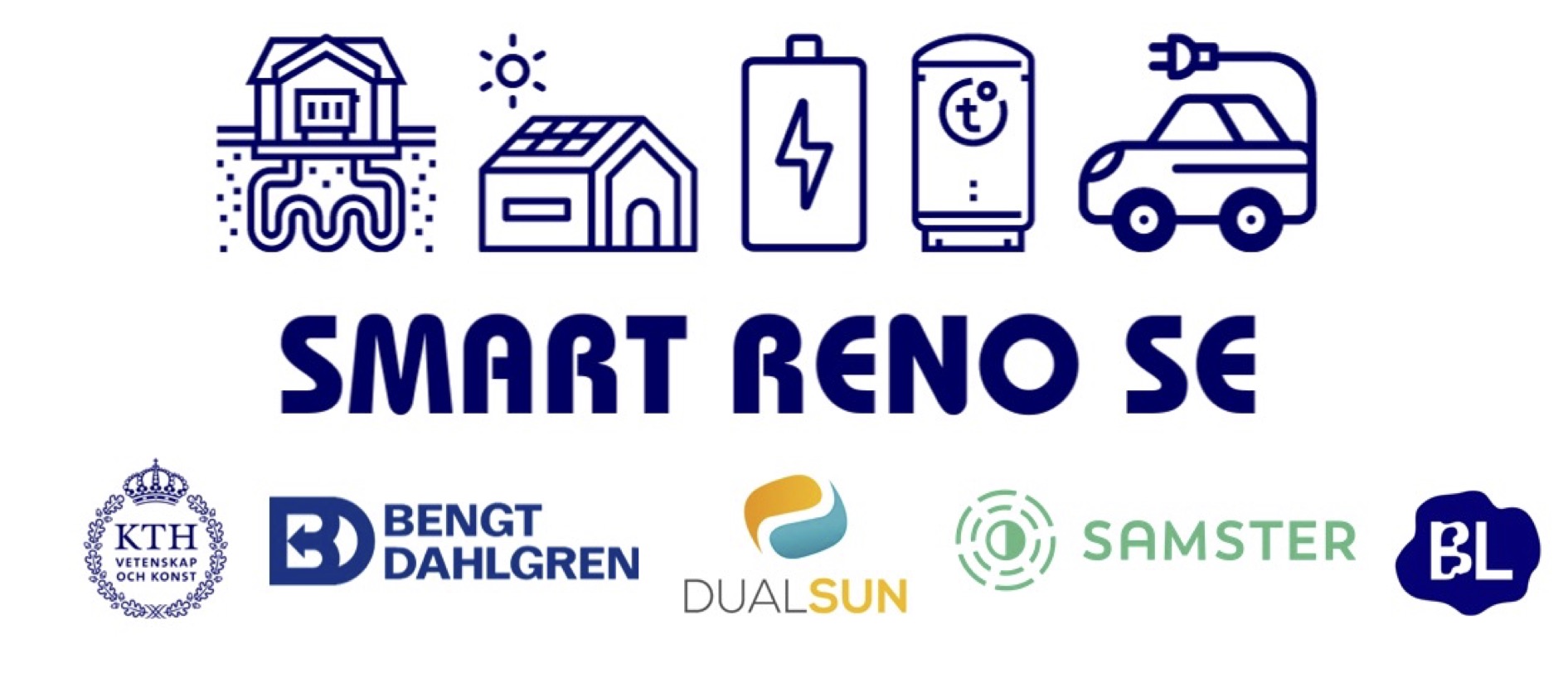Smart Renovation Strategies for Sustainable Electrification
This project aims to deliver a smart, holistic renovation strategy for existing buildings with ground source heat pumps considering a range of prosumer technologies. We take a user-centric approach by considering the diverse needs and preferences of decision-makers and qualify potential solutions through the lens of tradeoffs between technical, economic, environmental, and social factors.

Funded by: Energimyndigheten in the ReBygg Program
Time period: March 2024 – February 2027
Project partners:
- KTH Energy Technology
- Samster AB
- Bengt Dahlgren Stockholm Geo AB
- Beteendelabet AB
- DualSun Nordic AB
Background
Sweden is at the forefront of heat pump technology, particularly ground source heat pumps (GSHPs). Utilizing the ground as a heat source presents several challenges, including thermal degradation due time, design flaws, limited drilling space, or the increasing density of boreholes in urban areas. Furthermore, as buildings and heat pump technology evolve, there's a need to address changing heat demands and efficiency levels. Upgrading to more efficient heat pumps often strains existing boreholes and raises electricity demand, leading to higher costs.
To counter borehole temperature degradation, additional boreholes or ground loops may be necessary, adding to renovation expenses. While improving building efficiency can reduce heat demand, it may also inconvenience occupants. Alternatives such as air source heat pumps (ASHPs) or solar energy regeneration could provide cost-effective and less-invasive solutions. Additionally, battery storage and smart controls offer ways to manage peak power demands.
The energy landscape in Sweden is rapidly changing, with consumers seeking cost-effective solutions, leading to a surge in heat pump replacements. Similar trends are observed in prosumer technologies like solar PV and batteries, adding complexity to building energy system renovations. As the electricity system and market evolve, there's a growing need for clear objectives, comprehensive analysis, and easily adoptable solutions to address these challenges effectively.
Aim and Objectives
The first goal of the project is to advance knowledge in the renovation of GSHP through expanded ground energy extraction, regeneration, and storage. The integration of new heat sources with old boreholes creates a complex challenge around systems design and operation, such as thermal load imbalances within the borehole field, independent hydraulic control, and regeneration via active heat injection. A novel phase-change, thermal storage technology which is installed underground will also be modeled dynamically for the first time within this project. Empirical data from field tests will inform the geoenergy model development to ensure accurate quantitative results in the systems modeling.
The second goal is to quantify technically, economically, and environmentally the performance of a diverse range of system solutions for GSHP renovation. No one optimal solution is expected, but rather several solutions each prioritizing a particular performance aspect. To capture all the technological solutions, we aim to develop new, more flexible building energy models that build on existing technical capacities with integrated price signals.
Our final goal is to identify the preferences and adoption potential of the identified solutions by the end-users, e.g. homeowners in Sweden. Using the quantified systems results, we aim to present decision makers with as realistic a proposition as possible, and identify the tradeoffs used in the decision process. These tradeoffs expand on the quantitative results since they are largely subjective in their nature and relate to convenience of adoption or ownership.
Outcomes
Upon completion, this project intends to deliver:
- A flexible geo-energy extraction and injection model capable of representing multiple heat exchangers, with varying ages and temperatures, which can be coupled directly in a dynamic building energy supply model.
- A set of performance indicators for technical, economic, and environmental aspects for each system renovation alternative which will inform the discussion around trade-offs and end-user interviews.
- A holistic building supply system control strategy that can be easily implemented in the Swedish market, increases building flexibility, and minimizes owner cost.
- A set of qualitative preferences which, when combined with the quantitative results, provides new knowledge on the renovation potential of exisiting GSHP systems and supporting prosumer technologies.
Project contact persons
